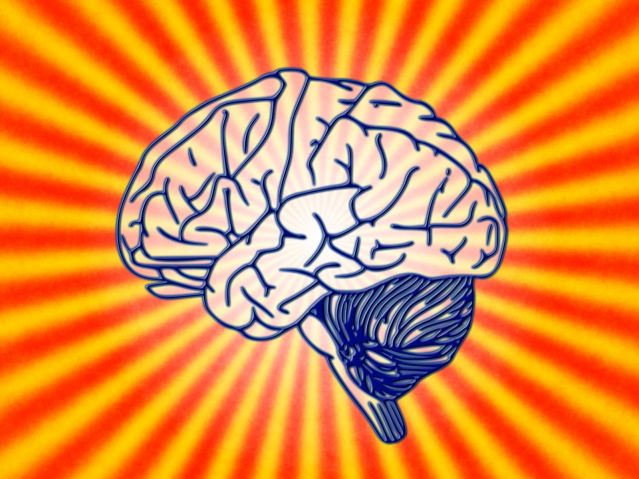Health
Moving Your Body Is Good for Your Mind
Physical activity is good for your body, brain, and mind.
Posted September 25, 2014


The ancient Greeks built a civilization around the concept of a sound mind in a sound body. “A sound mind in a sound body” is based on a quotation by the Greek philosopher Thales (624-546 BC). The ancient Greeks believed that there was a direct link between physical exercise and mental equilibrium.
Centuries ago, John Locke said, “A sound mind in a sound body, is a short, but full description of a happy state in this world: he that has these two, has little more to wish for.” Modern scientific studies have confirmed this timeless wisdom. What's good for your body is good for your mind, and what's good for your heart is good for your brain.
Daily habits that maintain—or improve—your physical health do the same for your mental health. Moving your body not only improves cardiovascular health, it improves cerebrovascular health. A wide range of recent studies have found that exercise improves brain function, structure, and connectivity. These brain improvements are directly linked to improved learning, memory, and cognitive function.
Physical activity has also been proven to be an effective treatment for depression, anxiety, insomnia, ADHD and a wide range of other psychological maladies. Exercise is medicine. In many cases, aerobic activity, strength training, yoga and mindfulness can be more effective than pharmaceutical treatments.
Moving Your Body Is Good for Your Mind

In a September 2014 study, Art Kramer and colleagues at the Beckman Institute at University of Illinois at Urbana-Champaign found that physical activity was linked to white matter integrity and improved cognitive function. Like Kramer, other researchers around the country—including Sam Wang at Princeton University—have long been advocates for physical activity as a key factor in promoting a lifespan of brain health.
In a 2007 New York Times Op-Ed tiltled "Exercise on the Brain" Wang and co-author Sandra Aamodt wrote, "Exercise is also strongly associated with a reduced risk of dementia late in life. People who exercise regularly in middle age are one-third as likely to get Alzheimer’s disease in their 70s as those who did not exercise. Even people who begin exercising in their 60s have their risk reduced by half."
New evidence on the benefits of physical activity on the mind and brain continues to fill scientific journals every month. An August 2014 study from the University of Montreal, “Hearts and Minds: Linking Vascular Rigidity and Aerobic Fitness with Cognitive Aging,” was published in the journal Neurobiology of Aging. In this study, researchers found that aerobic exercise that improved cardiovascular fitness may protect people from cognitive impairment as they age.

In a press release, first author Claudine Gauthier said, "Our body's arteries stiffen with age, and the vessel hardening is believed to begin in the aorta, the main vessel coming out of the heart, before reaching the brain. We found that older adults whose aortas were in a better condition and who had greater aerobic fitness performed better on a cognitive test. We therefore think that the preservation of vessel elasticity may be one of the mechanisms that enables exercise to slow cognitive aging."
The researchers worked with 31 young people between the ages of 18 and 30 and 54 older participants aged between 55 and 75. This enabled the team to compare the older participants within their peer group to the younger group who had yet to begin the aging processes in question.
For this study, participants undertook three MRI scans: one to evaluate the blood flow to the brain, one to measure their brain activity as they performed the Stroop task, and one to actually look at the physical state of their aorta.The researchers focused on the brain's blood flow because poorer cardiovascular health can lead to damage of the brain's smaller blood vessels.
The results demonstrated a link between age-related declines in executive function, aortic elasticity and cardiorespiratory fitness. This suggests that there is a correlation between vascular health and brain function, and a positive association between aerobic fitness and brain function. Art Kramer also believes that improved vascularization may be a prime reason for some of the brain benefits of not being sedentary.

Gauthier concluded, "The link between fitness and brain function may be mediated through preserved cerebrovascular reactivity in periventricular watershed areas that are also associated with cardiorespiratory fitness. Although the impact of fitness on cerebral vasculature may however involve other, more complex mechanisms, overall these results support the hypothesis that lifestyle helps maintain the elasticity of arteries, thereby preventing downstream cerebrovascular damage and resulting in preserved cognitive abilities in later life."
MENS SANA IN CORPORE SANO in MMXIV
Over two thousand years ago, the Roman poet Juvenal used the phrase “mens sana in corpore sano” (a sound mind in a sound body) in a poem describing the virtues of a “stout heart” being linked to herculean pursuits as opposed to “the loves of banquets and downy cushions."
The Strenuous Life was a speech given by Theodore Roosevelt in 1899 that focused on the importance of physical activity for maintaining a sound mind in a sound body and shares the sentiment of Juvenal's poem. In the speech, Roosevelt argued that strenuous effort and overcoming hardship should be ideals that Americans embrace for the betterment of the nation and the world as we entered the 20th century during the industrial age.
In the 21st century we face an unprecedented amount of sedentarism caused by living in a digital age and other lifestyle factors of living in 2014. What are the socioeconomic, physical, and psychological dynamics of living "the strenous life" today? In his famous speech from 1899, Teddy Roosevelt said:
I wish to preach, not the doctrine of ignoble ease, but the doctrine of the strenuous life, the life of toil and effort, of labor and strife; to preach that highest form of success which comes, not to the man who desires mere easy peace, but to the man who does not shrink from danger, from hardship, or from bitter toil, and who out of these wins the splendid ultimate triumph.
When he was growing up, Roosevelt was asthmatic and had a lot of health problems. As a teenager, he discovered that exercise made him more resilient and was an antidote for his physical ailments. After graduating from Harvard, Roosevelt was advised by doctors that due to heart problems, he should find a sedentary desk job and avoid strenuous activity. Roosevelt vehemently rejected this medical advice.

Instead of becoming less active, Roosevelt became an exercise fanatic as a way to overcome feeling like a "98-lb weakling." Throughout his adulthood, Teddy Roosevelt loved to box, play tennis, go hiking, play polo, row and explore the wilderness on horseback. Later in life, after some sports related injuries, he practiced jujutsu and he was known to love skinny-dipping in the Potomac River during winter.
The experience of feeling physically weak and sick during his youth probably influenced Teddy Roosevelt's passion for physicality, his adulthood bravado, and his machismo. I can relate to feeling like an underdog based on a lack of physical strength and athleticism. As a gay teen, I avoided physical activity and had what some might call "sissy-boy syndrome."
Running turned my life around when I was 17. Feeling societally "less than" but having physical stamina and mental toughness gave me the perfect blend of a chip-on-my-shoulder and the chutzpah to seize the day both in sports and academically.
Conclusion: Pursuing a Sound Mind in a Sound Body Circa 2014
Do you feel overworked, underpaid, and burned out? Is it difficult for you to find time in the day to do the things that you need to do to maintain a sound mind in a sound body? If so, you are not alone. I think most Americans feel financial strapped, physically drained, and psychologically stressed.
Maintaining a sound mind in a sound requires a combination of motivation, resources, and time. Unfortunately, modern living forces most of us to put the pursuit of wealth above the pursuit of health. For most Americans, simply keeping a roof over our heads and food on the table leaves little time or energy at the end of the day for physical exercise.
In his 1974 song, The Bitch Is Back, Elton John prophetically summed up the current statistics of the obesity epidemic when he sang, “Times are changing now the poor get fat.”
Unfortunately, as the socioeconomic gap widens, the rich have the leisure time and resources to take care of their bodies, stay active, buy organic foods, pamper themselves... Meanwhile, the majority of the population has to work overtime—at jobs that are primarily sedentary—just to make ends meet. I don’t think this is fair. What are the long-term effects of this socioeconomic disparity going to be on our solidarity, as well as, the physical and psychological health of our nation as a whole?

The digital age has created a workforce based primarily on sedentarism that wreaks havoc on our bodies and can cause our minds to short circuit. What can we do to change this modern day phenomenon? What are the long-term health care costs going to be for future generations if policy makers and business owners don’t strive to make it easier for the majority of Americans to get some type of physical activity every day?
I don't have the answers to these questions but am on a crusade to make regular physical activity more accesible for people of all ages and walks of life. I also am on a mission to motivate people to stay physically active throughout their lifespan. Hopefully, these scientific findings and historical context will motivate you to move more and be more politically active.
The best news of all the latest research is that a little exercise goes a long way. You may not be able to spend hours at the health club or working out, but you can still achieve a sound mind in a sound body by avoiding sedentarism. Recent studies from the Beckman Institute at the University of Illinois have shown that a little exercise most days of the week can dramatically benefit your body, brain, and mind.
If you'd like to read more on this topic, check out my Psychology Today blog posts:
- "Why Is Physical Activity So Good for Your Brain?"
- "Physical Activity Improves Cognitive Function"
- "What Daily Habit Can Boost “Healthy Aging” Odds Sevenfold?”
- "Five Lifestyle Choices That Will Help You Live Longer"
- "Why Does Aerobic Activity Improve Cognitive Function?
- "Can Physical Activities Improve Fluid Intelligence?"
- "I Want to Make You Want to Sweat"
- “Irisin: The “Exercise Hormone” has Powerful Health Benefits”
- “The Brain Drain of Inactivity”
- "The Neuroscience of Madonna's Enduring Success"
- "Physical Activity Boosts Brain Power"
Follow me on Twitter @ckbergland for updates on The Athlete’s Way blog posts.
Photos: Flickr/Pixabay




